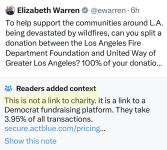cawacko
Well-known member
From what I've read, yes. But there clearly will be (large) price increases (otherwise insurers will pull out). And to your point, and this already started before the fires, mortgages were becoming contingent upon getting insurance (a lot has been written about this locally in the past couple of months actually).Going forward though is it feasible to insure against climate change level losses? I doubt it. Either the cost will become prohibitive or insurers will give up that part of the business. Then the domino effect on mortgage loans.
Everything is so fluid right now it's hard to say with certainty what will happen but I've not read anything (at least yet) saying they foresee a future with no insurers in the state.


